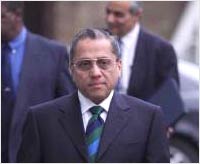Cutting off the nose...
Prem Panicker
It was a long, stormy meeting at the Taj Palace in New Delhi on Tuesday,
April 24.
And at the end of it all, the BCCI -- as represented by its working
committee -- appears to have put its foot in it, with a vengeance. To cut a
long story short, it is on the verge of cutting off its nose to spite its
face.
The story so far: The Government of India ordered the Board of Control for
Cricket in India not to send its teams to non-regular venues. Non-regular,
here, is defined as those venues that are not operated and controlled by
national cricket boards affiliated to the International Cricket Council.
The GoI, in an unrelated move, first refused permission for the Afro-Asian
Games, originally intended to be held in the capital in November. The
reasons for the refusal had nothing to do with politics -- the fact of the
matter is that the sports facilities in Delhi, erected with much fanfare
during the Indira Gandhi regime, have been allowed to run completely to seed
(and for this, the Federal Sports Ministers down the years need to take the
blame).

Conservative estimates indicate that if the Games are to be held, it will
involve an outlay of around Rs 200 crore -- which bill will have to be
footed by the GoI.
That begs the question -- is it really necessary to host the Games, at such
expense, at a time when the Indian rupee seems to be in freefall against the
more established currencies?
That however is another question, for another time. For now, the prospect of
such major expenditure had the government in a quandary. Enter, left, Suresh
Kalmadi, head of the Indian Olympic Association, with fighting talk.
The canny Kalmadi, aware that sports does not have much of a following in
this country, roped in cricket, which does. Kalmadi teamed up with Jagmohan
Dalmiya -- who has his own reasons for wanting cricket to be played in the
aforementioned non-regular venues. And the two decided to mount a joint
attack on the government -- with Dalmiya offering to convince the BCCI
working committee to go along.
It was against this background that the working committee met in Delhi on
Tuesday. And the score, at the end of hours of often acrimonious argument,
was 1-1. Thus, the Dalmiya faction as fronted by J Y Lele opposed the plan
mooted by Raj Singh Dungarpur, the public face of the very private Dr A C
Muthiah, for five zonal academies to feed the National Cricket Academy. The
opposition was cut down, and the five academies sanctioned. Score one, then,
for Team Muthiah.
Dalmiya, for his part, convinced the majority of the working committee to go
along with his aim of putting pressure on the government. The working
committee, on Dalmiya's urging, decided to inform the government that it
will not play in the ICC Trophy, the World Cup, the Asia Cup and suchlike,
until the government spells out a "clear policy" about which countries it
can play with and which it cannot.
Scoreline level, therefore, at 1-1.

Or is it? The outcome of the meeting reveals only one thing -- to wit, that
the Board has some very shoddy lawyer, or lawyers, working for it. For the
simple fact is that if the BCCI decides to go ahead with its plan to boycott
the World Cup and other official ICC fixtures, it will end up writing a
cheque for the entire contents of its overflowing treasury, by way of
punitive damages.
The situation is easily explained.
The BCCI is an affiliated body of the ICC. As per the command structure, the
ICC controls international cricket, with the various affiliated bodies
responsible for the game in their own respective regions. Tournaments such
as the World Cup are ICC-sponsored affairs, and the various boards are duty
bound to take part. Failure to do so can -- and in all probability will --
attract stringent strictures, ranging from fines to a complete cricketing
ban.
That was not the case with Sharjah, Toronto and Singapore. In these
tournaments, the contracts were entered into by the board on one hand, and
private parties on the other. At the very worst, one of these private
parties -- say the CBFS in Sharjah -- can file a case for breach of contract
against the Board.
The BCCI, in defense, can point out that it has not, by itself, refused to
play. It can argue that it is the government that has to permit the players
to travel to these venues, and when that permission is not forthcoming, it
is helpless.
In other words, it can cite force majeure as the reason for its
non-participation. If the case goes against the Board, it will be eligible
to pay damages, sure. But a Sharjah, or a Toronto, or a Singapore
cannot impose a ban on India playing cricket elsewhere, because
those venues do not have any such authority. And the ICC has, in the person
of Malcolm Gray, already stated that it will not interfere in the dispute.
Bottom line, the worst that can happen to the Board for not sending its team
to non-ICC-recognised venues is a claim for damages.
What happens, though, if the board on its own decides not to play the World
Cup?
The force majeure argument no longer holds. Because refusing to play is a
decision of the BCCI, it is not a decision imposed on it by the
government.
In other words, when the BCCI did not send its team to Sharjah, it was
because of external compulsions. If the BCCI decides not to send its team to
the ICC Knockout Tournament, or the World Cup, it is its own
decision.
And that decision is in breach of contractual obligations to the ICC -- and
as such, punishable by fines, bans, whatever.
It's like this -- I am contracted to Rediff. If the Rediff management orders
me not to do something, no action of any consequence can be taken against
me. However, if I unilaterally decide to refrain from some act, which is
part of my contractual obligation with Rediff, then I am in it up to the
neck.
The BCCI, if it decides to go ahead with its supposed threat, is thus in
deep legal water.
For a threat to be effective, the person threatened has to stand to lose
something if I carry out the threat. In this case, what does the government
stand to lose if the BCCI does not play the World Cup?
Nothing. Nada.
Which is why I believe the Board has goofed, big time. It is now faced with
one of two choices -- it can either go ahead with its proposed threat, and
face the consequences thereof, or it can backtrack, at much loss of face.
There is no denying that it is imperative for the government to spell out a
policy regarding who India can play, and who it cannot.
But then, the policy already exists. Think back to India's last tour Down
Under. Shortly before that, India had boycotted a series against Pakistan,
in the wake of the latter's encroachment in Kargil. Just in case it escapes
the collective memory, it was not the government that came up with the
decision to boycott -- the call was first made by eminent cricketers headed
by the then coach, Kapil Dev Nikhanj. The government merely bowed to public
sentiment in the matter.
However, less than two months later, India did play Pakistan, in a
triangular one day series, on Australian soil. With the government's
go-ahead.
That indicates that the government has no problem with India playing
Pakistan in an officially recognised tournament. And that policy still
holds. Thus, the GoI -- always granting that another Kargil doesn't erupt in
the interim -- has no problem with India playing Pakistan in the ICC
Knockout, or Asia Cup, or World Cup, or whatever.
So why is the BCCI making a huge fuss here?
The answer is simple -- the board, or sections thereof, are not really
concerned with the government's foreign policy, as pertains to playing
Pakistan. What a certain section of the board wants, is to arm-twist the
government into reversing its decision, and letting the Indian team play in
non-regular venues.
And that, in turn, begs the question -- why?
If you look at the official ICC calendar, keeping in mind that the World
Test Championship cycle will be officially kicked off in May, you will find
that India has no dearth of cricketing commitments.
As per that calendar -- which India, along with the rest of the member
nations of the ICC, has formally signed -- India is next slated to play
Pakistan in the year 2002.
So what is the uproar about, at this point in time? Who is behind this drive
to "put pressure on the government"? And what does that person, or persons,
have at stake?
These are questions that deserve to be asked. I doubt, however, whether you
will receive honest answers.
Prem Panicker
Mail Prem Panicker